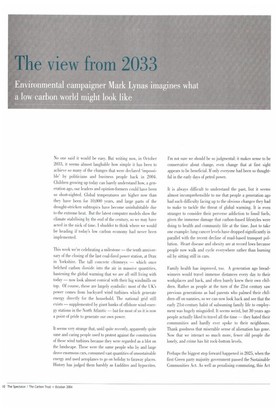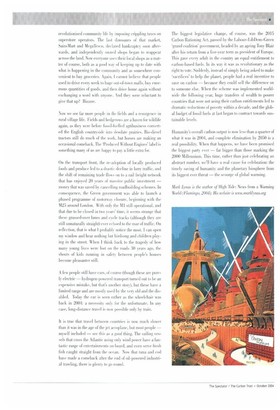No one said it would be easy. But writing now,
in October 2033, it seems almost laughable how simple it has been to achieve so many of the changes that were declared 'impossible' by politicians and business people back in 2004. Children growing up today can barely understand how, a generation ago, our leaders and opinion-formers could have been so short-sighted. Global temperatures are higher now than they have been for 10,000 years, and large parts of the drought-stricken subtropics have become uninhabitable due to the extreme heat. But the latest computer models show the climate stabilising by the end of the century, so we may have acted in the nick of time. I shudder to think where we would be heading if today's low carbon economy had never been implemented.
This week we're celebrating a milestone — the tenth anniversary of the closing of the last coal-fired power station, at Drax in Yorkshire. The tall concrete chimneys — which once belched carbon dioxide into the air in massive quantities, hastening the global warming that we are all still living with today — now look almost comical with their big windmills on Lop. Of course, these are largely symbolic: most of the UK's power comes from backyard wind turbines which generate energy directly for the household. The national grid still exists — supplemented by giant banks of offshore wind-ener gy stations in the Nm-th Atlantic but for most of us it is now a point of pride to generate our own power.
It seems very strange that, until quite recently. apparently quite sane and caring people used to protest against the construction of these wind turbines because they were regarded as a blot on the landscape. These were the same people who by and large drove enormous cars, consumed vast quantities of unsustainable energy and used aeroplanes to go on holiday to faraway places. History has judged them harshly as Luddites and hypocrites. I'm not sure we should be so judgmental: it makes sense to be conservative about change, even change that at first sight appears to be beneficial. If only everyone had been so thoughtful in the early days of petrol power.
It is always difficult to understand the past, but it seems almost incomprehensible to me that people a generation ago had such difficulty facing up to the obvious changes they had to make to tackle the threat of global warming. It is even stranger to consider their perverse addiction to fossil fuels, given the immense damage that carbon-based lifestyles were doing to health and community life at the time. Just to take one example: lung cancer levels have dropped significantly in parallel with the recent decline of road-based transport pollution. Heart disease and obesity are at record lows because people now walk and cycle everywhere rather than burning oil by sitting still in cars.
Family health has improved, too. A generation ago breadwinners would travel immense distances every day to their workplaces and back, and often barely knew their own children. Rather as people at the turn of the 21st century saw previous generations as bad parents who palmed their children off on nannies, so we can now look back and see that the early 21st-century habit of subsuming family life to employment was hugely misguided. It seems weird, but 30 years ago people actually liked to travel all the time — they hated their communities and hardly ever spoke to their neighbours. Thank goodness that miserable sense of alienation has gone. Now that we interact so much more, fewer old people die lonely, and crime has hit rock-bottom levels.
Perhaps the biggest step forward happened in 2025, when the first Green party majority government passed the Sustainable Communities Act. As well as penalising commuting, this Act revolutionised community life by imposing crippIi taxes on
superstore operators. The last dinosaurs of that market, SainsMart and fielegaTesco, declared bankruptcy soon afterwards, and independently owned shops began to reappear across the land. Now everyone uses their local shops as a matter of course, both as a good way of keeping up to date with what is happening in the community and as somewhere convenient to buy groceries. Again, I cannot believe that people used to drive every week to huge out-of-town malls, buy enormous quantities of goods, and then drive home again without exchanging a word with anyone. And they were reluctant to give that up? Bizarre.
Now we see far more people in the fields and a resurgence in rural village life. Fields and hedgerows are a haven for wildlife again, as they were before fossil-fuelled agribusiness converted the English countryside into desolate prairies. Bio-diesel tractors still do much of the work, but horses are making an occasional comeback. The Produced Without Engines' label is something many of us are happy to pay a little extra for.
On the transport front, the re-adoption of locally produced foods and produce led to a drastic decline in lorry traffic, and the shift of remaining trade flows on to a rail freight network that has enjoyed 20 years of massive public investment — money that was saved by cancelling roadbuilding schemes. In consequence, the Green government was able to launch a phased programme of motorway closure, beginning with the M25 around London. With only the M1 still operational, and that due to be closed in two years time, it seems strange that these grassed-over lanes and cycle tracks (although they are still unnaturally straight) ever echoed to the roar of traffic. On reflection, that is what I probably notice the most. I can open my window and hear nothing but birdsong and children playing in the street. When I think back to the tragedy of how many young lives were lost on the roads 30 years ago, the shouts of kids running in safety between people's houses become pleasanter still.
A few people still have cars, of course (though these are purely electric — hydrogen-powered transport turned out to he an expensive mistake, but that's another story). but these have a limited range and are mostly used by the very old and the disabled. Today the ear is seen rather as the wheelchair was back in 2004: a necessity only for the unfortunate. In any ease, long-distance travel is now possible only by train.
It is true that travel between countries is now much slower than it was in the age of the jet aeroplane, but most people — myself included — see this as a good thing. The sailing vessels that cross the Atlantic using only wind power have a fantastic range of entertainments on board, and even serve fresh fish caught straight from the ocean. Now that tuna and cod have made a comeback after the end of oil-powered industrial trawling, there is plenty to go round.
The biggest legislative change, of course, was the 2015 Carbon Rationing Act, passed by the Labour—LibDem—Green 'grand coalition' government, headed by an ageing Tony Blair after his return from a live-year term as president of Europe. This gave every adult in tlie country an equal entitlement to carbon-based fuels. In its way it was as revolutionary as the right to vote. Suddenly, instead of simply being asked to make 'sacrifices' to help the planet, people had a real incentive to save on carbon because they could sell the difference on to someone else. When the scheme was implemented worldwide the following year, huge transfers of wealth to poorer countries that were not using their carbon entitlements led to dramatic reductions of poverty within a decade, and the global budget of fossil fuels at last began to contract towards sustainable levels.
Humanity's overall carbon output is now less than a quarter of what it was in 2004, and complete elimination by 2050 is a real possibility. When that happens, we have been promised the biggest party ever — far bigger than those marking the 2000 Millennium. This time, rather than just celebrating an abstract number, we'll have a real cause for celebration: the timely saving of humanity and the planetarybiosphere from its biggest ever threat — the scourge of global warming.
Mark Lynas is the author of High 'Tide: News from a Warming World (Flamingo, 20(4). His website is amr.maxklyrtas.org



















































































































 Previous page
Previous page